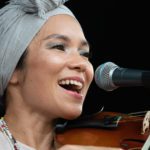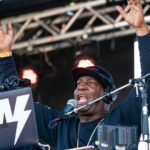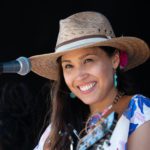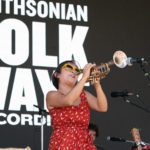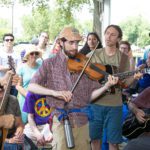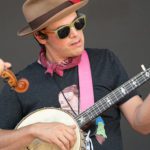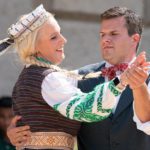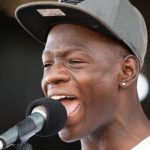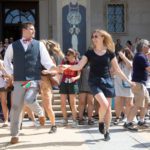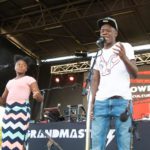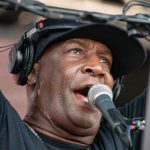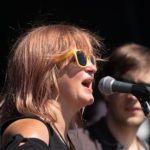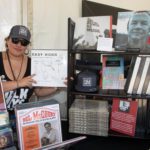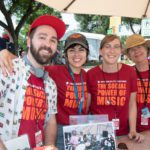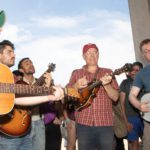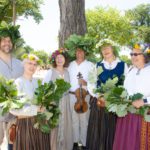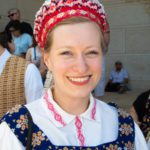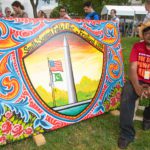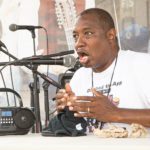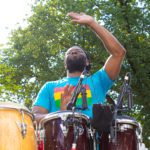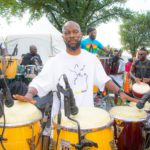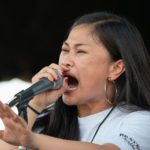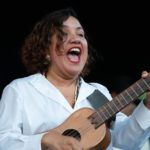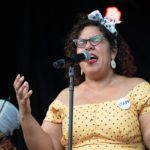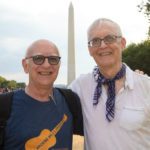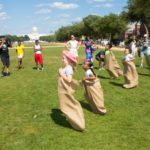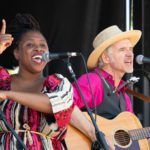Folklife Festival Showcases ‘The Social Power of Music’ (photos)
By • July 1, 2019 0 2430
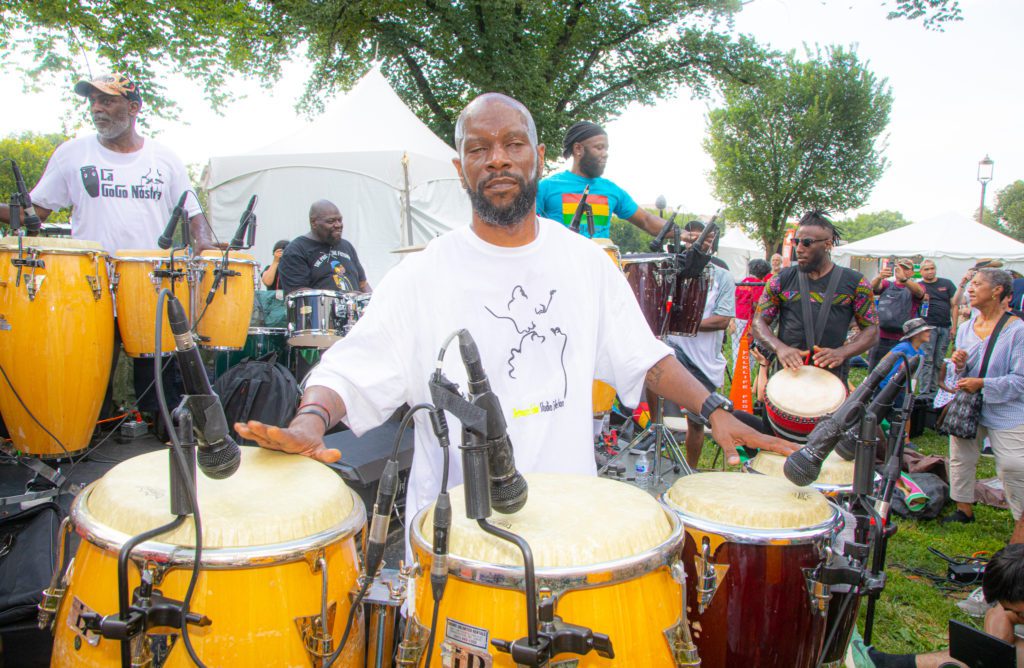
“The Social Power of Music” was the theme of the 52nd edition of the Smithsonian Folklife Festival, held June 29 and 30 on the National Mall in Washington D.C.
The festival this year was pared down to just two days of concerts instead of the 10 days of recent years. The changes stemmed from last winter’s 35-day government shutdown. Apparently the logistics of coordinating artisans, dancers and musicians from around the world proved to be too much for schedulers.
But what might have been missing in size did not lack for scope and energy. For those diehard fans able to brave the bright sun and 90-degree temperatures, this year’s festival was still a musical feast.
Saturday was dedicated to exploring the history and social fabric of the D.C. music scene. Festival-goers were treated to a perfomance by the Royal Pocket Tour, featuring an all-star lineup of go-go drummers and conga percussionists from different bands. Go-go, the popular music style associated with funk, originated in the Washington, D.C., area between the mid-1960s and the late-1970s.
Independent record labels have long been a staple of the D.C. music scene. Festival-goers were able to meet the people and browse the collections behind the labels that typically operate only as mail-order retail.
The D.C. Bluegrass Union invited all comers for an open jam outside on the National Mall. D.C. has had a significant bluegrass underground since the late 1940s. Over the last two decades, it has been undergoing a renaissance, and D.C. Bluegrass Union has contributed to supporting and promoting the music locally.
The evening concert, themed “The Fierce Urgency of Now: Modern Troubadours, Poets, and Wordsmiths,” featured a set by Filipino-American rapper and spoken-word artist Ruby Ibarra; the Los Angeles-based ensemble Quetzal; punk rock pioneer Alice Bag; and Marisol “La Marisoul” Hernandez, the lead singer in the Mexican American band La Santa Cecilia. The concert concluded with a performance by D.C. hip hop artist Kokayi.
Sunday’s festivities began with a special concert marking the 100th anniversary of the birth of folk music legend Pete Seeger. Mexican American singer-songwriter Sonia De Los Santos, Grammy Award winners Dan and Claudia Zanes and the children’s group You Are My Flower performed many of the songs popularized by Seeger, including “If I Had A Hammer,” “Turn! Turn! Turn!,” “Guantanamera” and a bilingual “This Land is Your Land.”
On sale at the festival was the Smithsonian Folkways Collection’s newly published anthology of the works of Seeger, featuring a 200-page book with “classic recordings, 20 previously unreleased tracks, historic live performances, and special collaborations [spanning] over 60 years of Pete’s Folkways catalog, released on the occasion of his 100th birthday.”
In 1998, the Smithsonian Folklife Festival featured Estonia, Latvia and Lithuania as part of a program titled “The Baltic Nations.” This year, some of the dance groups came back for an encore performance on the plaza in front of the Smithsonian’s Freer Gallery of Art.
Part of the Smithsonian’s “Year of Music,” 365 days of music or sound events, all hosted by the institution, the 2019 festival concluded on Sunday with a sonic history of hip hop starring legendary DJ Grandmaster Flash.
The festival is set to return to its full length next year, which will feature the cultures of Brazil, Benin and the Southern United States.
View Jeff Malet’s photos from the 2019 Smithsonian Folklife Festival by clicking on the photo icons below.
- Tylana Enomoto plays violin and provides backing vocals for Quetzal. (photo by Jeff Malet)
- Grandmaster Flash Presents Hip-Hop: People, Places, and Things – A Video Experience for Families (photo by Jeff Malet)
- Music producer Tone P from SW DC. (photo by Jeff Malet)
- Sonia De Los Santos (photo by Jeff Malet)
- Elena Moon Park performing with Sonia De Los Santose at the Pete Seeger tribute concert.. Photo by Jeff Malet.
- Alice Bag was the lead singer and co-founder of the Bags, one of the first bands to form during the initial wave of punk rock in Los Angeles. (photo by Jeff Malet)
- D.C. Bluegrass Union open jam! (photo by Jeff Malet)
- Elizabeth Mitchell & You Are My Flower. (photo by Jeff Malet)
- with Elizabeth Mitchell & You Are My Flower. (photo by Jeff Malet)
- The dancers will lead participants and visitors across Jefferson Drive to the center of the National Mall for a traditional Estonian sack race. (photo by Jeff Malet)
- Karima Hurt and Bill Berlin dance to the music of Sonia De Los Santos (photo by Jeff Malet)
- Festival director Sabrina Lynn Motley (photo by Jeff Malet)
- Nolan Williams, Jr. Community Sing (photo by Jeff Malet)
- Whether on the D.C. Metro or MTV’s TRL, brother-and-sister duo Tarron Stewart and Jourdan Jones have entertained the masses with a simple bucket drum and soaring voices. (photo by Jeff Malet)
- Clapping to the beat of Grandmaster Flash. (photo by Jeff Malet)
- The Baltimore Lithuanian folk dance group Malūnas invite visitors to join (photo by Jeff Malet)
- Whether on the D.C. Metro or MTV’s TRL, brother-and-sister duo Tarron Stewart and Jourdan Jones have entertained the masses with a simple bucket drum and soaring voices. (photo by Jeff Malet)
- Grandmaster Flash Presents Hip-Hop: People, Places, and Things – A Video Experience for Families (photo by Jeff Malet)
- Kristin Andreassen. The Bright Siders present music that helps kids and families have meaningful conversations about emotions. (photo by Jeff Malet)
- Attendee Jamie, a dancer from Gairthersburg Md. likes her music loud. (photo by Jeff Malet)
- Smithsonian Folkways. (photo by Jeff Malet)
- Representing the Smithsonian’s Ralph Rinzler Folklife Archives and Collections (photo by Jeff Malet)
- D.C. Bluegrass Union open jam! (photo by Jeff Malet)
- D.C. area Latvian folk ensemble Sudrabavots (“Silver Spring”) (photo by Jeff Malet)
- The Baltimore Lithuanian folk dance group Malūnas (“The Windmill”) will demonstrate traditional dance.. (photo by Jeff Malet)
- D.C. Bluegrass Union open jam! (photo by Jeff Malet)
- Artist Haider Ali with an example of his Pakistani Truck Art(photo by Jeff Malet)
- Nico “the Gogologist” Hobson of GoGo Radio LIVE takes listeners on a guided audio tour through a recording of a go-go show. (photo by Jeff Malet)
- (photo by Jeff Malet)
- Wuiping Yap, director of the Asian Heritage Foundation, attends Folklife. (photo by Jeff Malet)
- “Sauce” of The Royal Pocket Tour performs Go-Go. (photo by Jeff Malet)
- The King Of The Congos, Samuel “GoGo Smoke” Dews of the band Rare Essence performs with the Royal Pocket Tour at the Folklife Festival. Photo by Jeff Malet.
- Filipino-American rapper and spoken word artist Ruby Ibarra. (photo by Jeff Malet)
- Filipino-American rapper and spoken word artist Ruby Ibarra. (photo by Jeff Malet)
- Martha Gonzalez is lead vocalist for Quetzal. (photo by Jeff Malet)
- Marisol “La Marisoul” Hernandez is the lead singer in the Mexican American band La Santa Cecilia. (photo by Jeff Malet)
- Anthony Seeger (nephew of Pete) and ethnomusicologist Jacob Wainwright Love in attendance. (photo by Jeff Malet)
- The dancers lead participants and visitors across Jefferson Drive to the center of the National Mall for a traditional Estonian sack race. (photo by Jeff Malet)
- Grammy winner Dan & Claudia Zanes (photo by Jeff Malet)

